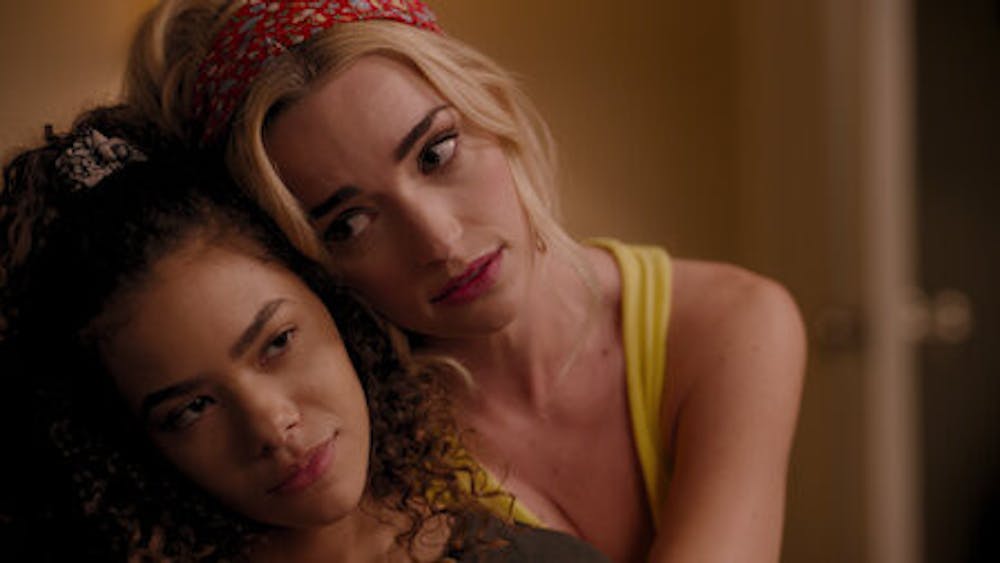The plot of “Ginny & Georgia” is painfully predictable. It follows a format characteristic of streaming-era young-adult dramedies: at the center, a teenage girl of color, usually a “misfit,” struggles to navigate friends, romance, school and family. She braves the trials and tribulations of adolescence with her BFFs while struggling with her own greater demons. The all-inclusive twist on this trope is a plot that drops curated moments of racism, misogyny or other forms of discrimination in a surface-level attempt to provide social commentary.
“Ginny & Georgia,” “Never Have I Ever,” “To All the Boys I’ve Loved Before” and “The Sex Lives of College Girls”: These are “representative” stories, ones that center young minority women in a beloved Hollywood trope. Stories that insert them into a classic archetype in American television while simultaneously including just enough direct social critique to stay “woke.” “Inclusive” stories like “Ginny & Georgia” are successful with modern audiences and are a refreshing alternative to the characters that women of color have been pigeonholed into in the past: let’s not forget Octavia Spencer’s countless roles as different variations on the mammy stereotype, or the hundreds of nerdy, Asian sidekick characters begging for the spotlight.
But “Ginny & Georgia” isn’t like that; there are diverse characters, plotlines and dialogues, with plot twists that add excitement to the not-so-original storyline. So why do I (a mixed woman in reluctant but desperate need of representation) still struggle to enjoy it?
When Georgia Miller moves with her son Austin and daughter Ginny to New England to give her family a fresh start, she quickly learns that a change of scenery does not equate to leaving her past behind. Ginny finds herself navigating a completely foreign environment — new friends, new fashion trends, a new love triangle — but all the while struggling with the same truth as her mother: old habits die hard. The story pivots between Ginny’s and Georgia’s everyday challenges, love interests and personal demons. Each finds a new passion — with Georgia working in the mayor’s office and Ginny using poetry to connect with her racial identity — and a new sense of community and love (or booty calls at the very least).
Lucy Mangan of The Guardian provides an honest and simple take that, to me, perfectly characterizes the show: “It is trash. Better yet, it is good trash. It deserves not a single award, until and unless someone creates a category for Most Absurdly Entertaining Entertainment.” “Ginny & Georgia” isn’t winning any awards for exemplary acting, artful writing or originality, but it's evident that the show has viewers reacting strongly. While the majority of online discourse surrounding the show is debates between which character is the most annoying, viewers are torn about their general opinions of the series. One user says “‘Ginny & Georgia’ is the type of show I will watch even if it irritates the absolute fuck out of me”, but others are more on the fence saying, “I have a love hate relationship with ‘Ginny and Georgia.’ Absolutely hate Ginny’s cringe watpadd-ey story [but] absolutely love Georgia’s backstory.”
What’s clear from the reviews, tweets and TikToks is that the show has a strong emotional impact on audiences, be it good or bad. While the plot and all of its characters receive criticism, the most frequent recipient of the negative reactions to the show is undoubtedly Ginny.
While the plot divides its focus equally between both mother and daughter, Ginny, by the very nature of her character, holds the role as a “representative” of the experiences of the typical mixed-race teenage girl, both to fellow characters in the show and the audience at home.
Ginny is a textbook example of “palatable” representation of minorities on screen: she is light skinned with curly (not kinky) hair, upper-middle class, educated, heterosexual and, to be frank, lame. Ginny is innocent, good-natured, smart: a white person’s idea of what a model young black woman — or any “model minority” — should look and act like. But in the emerging category of coming-of-age stories with diverse casts engaged in gentle social critique, Ginny is hardly the leader of Black liberation.
Even though her character is unbelievably cringey, I still relate to Ginny. The moments in which Ginny experiences ostracization and discrimination for her racial identity are ones that could have been pulled from my own life. Between my moments of secondhand embarrassment for this fictional character are heart aches. Strings are pulled that bring me back to my teen years that remind me of the confused but passionate mixed-girl I once was. While I hate to admit it, I see my experiences represented in her story. And that makes me feel understood. Validated, even. But only for a while. Until one of the characters quips with an “as-if” or (mild spoiler) Ginny’s boyfriend performs a romantic dance number in the school hallway. Then we’re back to cringing.
Is it enjoyable to watch? Depends. Is it entertaining? Certainly. Would I recommend “Ginny & Georgia” to someone else? Sure, why the hell not.
Get The Chronicle straight to your inbox
Signup for our weekly newsletter. Cancel at any time.

